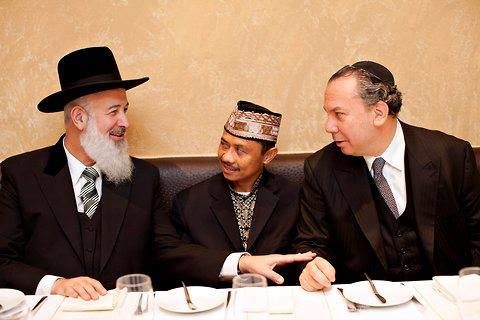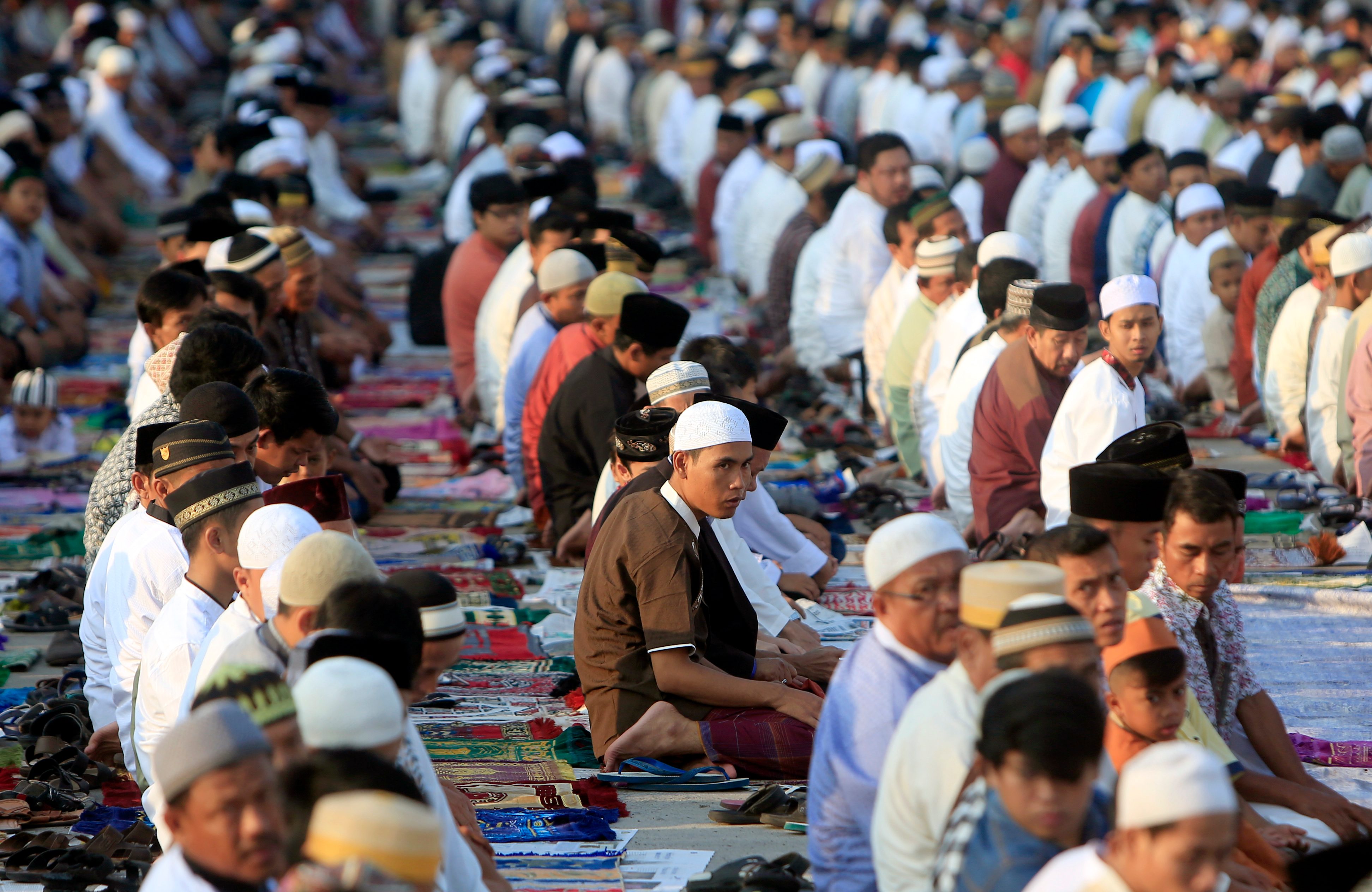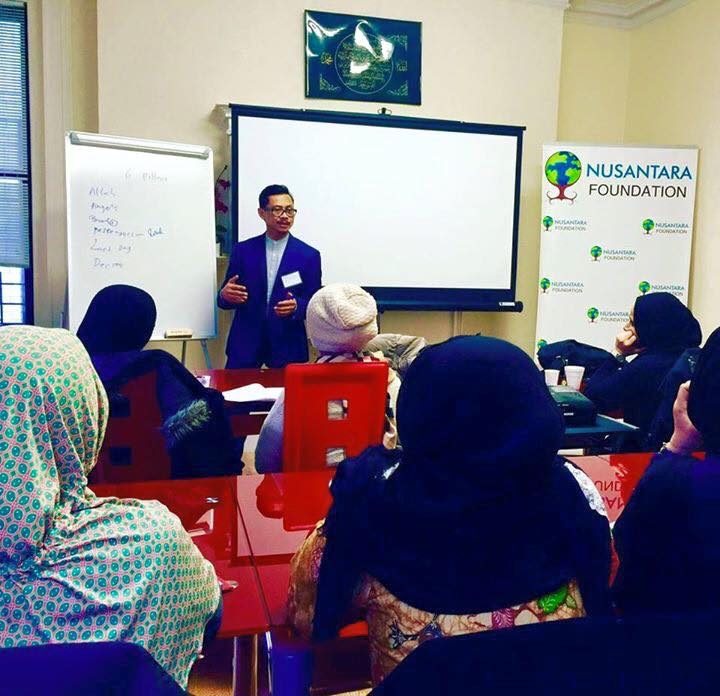SUMMARY
This is AI generated summarization, which may have errors. For context, always refer to the full article.

NEW YORK CITY, United States – “Assalamu’alaikum warahmatullahi wabarakatuh.”
Imam Shamsi Ali, a prominent inter-faith speaker and activist, opened his weekly Saturday class for Islamic converts at the Nusantara Foundation with the traditional Muslim greeting: “May the peace, mercy, and blessings of Allah be with you.”
The Nusantara Foundation’s offices are located on 4 West 43rd Street, a stone’s throw away from Times Square. The building, owned by the Holy Spirit Association for the Unification of World Christianity is home to many religious and cultural foundations and other nonprofits, including the Muslim Education and Converts Center of America and Amref Health Africa among others.
The Foundation’s suite on the sixth floor consists of 3 small, messy rooms, with boxes and knick-knacks strewn about the corners. The biggest room is used as the classroom with long red tables and red chairs that stand out against the stark white walls.
Like his offices, Imam Shamsi Ali is small and unassuming. His short hair was neatly styled, and instead of the stereotypical bushy beard one associates with Muslim clerics, he wore a short mustache and goatee. Instead of long flowing robes, he wore a light brown shirt and grey jacket.
Much has been said in the press lately about how the recent attacks by ISIS and other extremist Islamic groups across the world have led to a rise in Islamaphobia in the United States and elsewhere in the Western world and the conflation of the Islamic faith with acts of terrorism and violence.
Recent polling data confirms this: a November 2015 poll by the Public Religion Research Institute found that a majority of Americans (56%) think that Islamic values are “at odds with American values and way of life,” up from 47% in 2011, while a September 2015 poll by Public Policy Polling in Iowa found that 30% of Republicans think that Islam should be illegal.
Breaking the silence

With over 250 million people, Indonesia is home to the largest Muslim population in the world. Yet little has been heard from it recently, even in the wake of such events and the ensuing storm of public opinion.
Now various Indonesian Muslim organizations are trying to break this silence by releasing documentaries, holding discussions, and educating other religious leaders in the West about moderate and mainstream Islam as practiced in the archipelago.
Here in New York, an effort is being made by Indonesian-born Ali, formerly the imam of the Islamic Cultural Center, whose work includes advising the Indonesian Mission to the United Nations and training the FBI and other US government agencies in cultural sensitivity.
Ali founded the Nusantara Foundation in 2013 and describes it as “a faith-based social services organization” that aims to promote inter-faith dialogue between Muslims and their communities. It also aims to increase Indonesia’s visibility as one of the world’s largest Muslim nations. “Nusantara” is the Indonesian word for archipelago and is often used as a synonym for Indonesia itself.
“When I go to inter-faith events to speak,” said Ali, speaking in Indonesian, “I sometimes ask the audience what the most populous Muslim nation is. Usually they say Saudi Arabia [35 million Muslims] or Egypt [80 million Muslims]. When I say it’s in Southeast Asia, they start saying Malaysia [17 million Muslims], Thailand [4 million Muslims], or even the Philippines [4 million Muslims]. No one ever says Indonesia.”
Ali was born in a small village in South Sulawesi and describes himself as a “Bugis Makassar,” a predominantly Muslim tribe that is known for its members’ tendency to “merantau” or wander about. This is evidenced by the significant Bugis populations in Malaysia and Singapore and even the Netherlands.
Ali himself fits this stereotype. After finishing high school at a pesantren or Islamic boarding school, he received a scholarship to the International Islamic University in Islamabad, Pakistan where he received his BA and MA in religious studies. He came to New York in December 1996, when he was invited to lead the Indonesian congregation at Masjid Al-Hikmah in Astoria, Queens.
“I had very frightening perceptions of America,” said Ali. “I had one thousand and one questions about America. Would I be able to practice my religion? Would I be able to raise my children according to Islam?”
But after arriving in New York, he discovered that his fears were unfounded. “I actually feel even more religious in the US than I did in Muslim countries,” he said, adding that the US and its constitution is strongly based on freedom. “We cannot practice Islam well without freedom.”
Islam in America

He told a story about the Irish Catholic neighbor that he had when he first moved to Queens.
“He would always help sweep the front of my house,” said Ali. “At first, I felt very suspicious. Was his kindness just a ploy? Was he trying to Christianize me?”
But the neighbor never brought up religion, except to ask about Ali’s headscarf-wearing wife. It was from this experience that he realized that he could learn much about religiosity from other faiths, be they Catholic, Buddhist or Hindu.
“Religiosity,” he emphasized, “not religion.”
That is not to say that he hasn’t had any unpleasant experiences in the US because of his religion. Since 9/11, he has often been delayed in the checking-in process at airports because of his distinctively Islamic name, Muhammad Shamsi Ali. He also knows of Indonesians who have suffered worse than inconveniences.
At the same time, Ali thinks that such events, though horrible, can provide opportunities. “Just after 9/11, there was an opening. I regret that the Indonesian government did not take the opportunity to position itself as a leader in the Muslim world. After that we lost the momentum.”
He thinks the reason Indonesia has not asserted itself more internationally is due what he calls “budaya malu-malu” or culture of shyness. Indonesia’s culture of excessive politeness and tendency to let others go first means that it is often overlooked in global discussion.
“That’s why sometimes I force myself, even though I am small,” said Ali with a self-deprecating smile. “In Islamic or inter-faith conferences with these big Caucasians and Arabs, I force myself to speak, so that Indonesia can also be heard.”
Indonesian Islam
His view is shared by the Nahdlatul Ulama, an Indonesian Islamic organization that claims to have over 50 million members. NU, as the organization is commonly called, recently released a film called, “The Grace of Islam Nusantara,” documenting the spiritual and pluralistic practices of Islam in Indonesia as a contrast to the violent ideology of jihadist groups.
“The purpose of the film was to highlight the fundamental difference between Islam Nusantara and Islam in the Middle East,” said C. Holland Taylor, an expert on Islam and Islamization in South East Asia and a co-founder of LibForAll, which partnered with NU to make the film.
“Islam came late to the Indonesian archipelago,” explained Holland. “It was accepted by the people as just another form of the ultimate truth. Because of this, Indonesians have a more mystical view of the religion as opposed to the formalistic view that is common in the Middle East.”
“There is a common saying among Indonesian Muslims,” said Holland, “that every day Arabs come to Indonesia to teach Indonesians about Islam, but it’s actually the destiny of Indonesians to help inspire Arabs about the true and essential Islam, which is about universal love and compassion.”

Although the imam is not affiliated with NU, Holland said he thinks that Ali is doing valuable work. “It is a natural expression of his personality, which has been shaped by the Nusantara civilization.”
Holland and Ali both used the term “Islam rahmatan lil ‘alamin”, Islam as a mercy to all beings. The term comes from the Qu’ran, Surah Al-Anbya verse 21: “We have not sent thee, [O Muhammad], save as a mercy unto all beings.”
Criticisms
But there are those who dispute the notion that Ali or Indonesia is truly moderate. Andreas Harsono, an Indonesian journalist and researcher for the Human Rights Watch, is one of them.
In 2013, the same year that Ali established the Nusantara Foundation, Harsono penned a report entitled, “In Religions Name: Abuses against Religious Minorities in Indonesia.” The year before, he wrote an op-ed for the New York Times stating that “Indonesia is no model for Muslim democracy.”
“Indonesia is not moderate,” said Harsono in a phone interview. “Neither is it a Muslim democracy.” More than 1,000 churches have been closed down this year alone, he continued, and attacks against Ahmadiyya and Shia Muslim sects are common.
Harsono gave the Nahdlatul Ulama and its efforts a mixed review.
“In general, of course NU is a more tolerant organization,” he said. He applauds NU’s efforts to combat Salafism and Wahhabism in Indonesia. “The thing is NU still does not address the violence faced by minority sects such as the Ahmadiyya. I’m afraid it’s not substantial enough.”
On Ali, Harsono is more scathing: “Shamsi Ali is a joke.”
Harsono said that Ali is not for religious freedom but instead a proponent of “religious harmony.” In 2006, “religious harmony” laws were passed in Indonesia which made it substantially more difficult for minorities to build their houses of worship.
Harsono added that Ali is a supporter of the concept of “dhimmi,” essentially making non-Muslims second-class citizens in Muslim-run Indonesia. “Does that sound like a moderate to you?”
At the same time, Ali is not without his conservative detractors. His work with government agencies has led to accusations that he is an “FBI mouthpiece.” His emphasis on inter-faith dialogue and frequent talks at synagogues do not sit well with more conservative elements, especially given that the Indonesian government has still not officially recognized the state of Israel.
He is candid about these criticisms, but remains confident in his approach.
“Now is the time for moderate Islam, Islam rahmatan lil ‘alamin. And the time for Indonesia to show the world its own brand of Islam. We shouldn’t let other, louder voices proclaim their version of Islam, which is not necessarily authentic,” said Ali passionately. “I think the character of Indonesia is naturally what the character of Islam is: friendly, humble, cooperative and gentle.” – Rappler.com
Add a comment
How does this make you feel?
There are no comments yet. Add your comment to start the conversation.